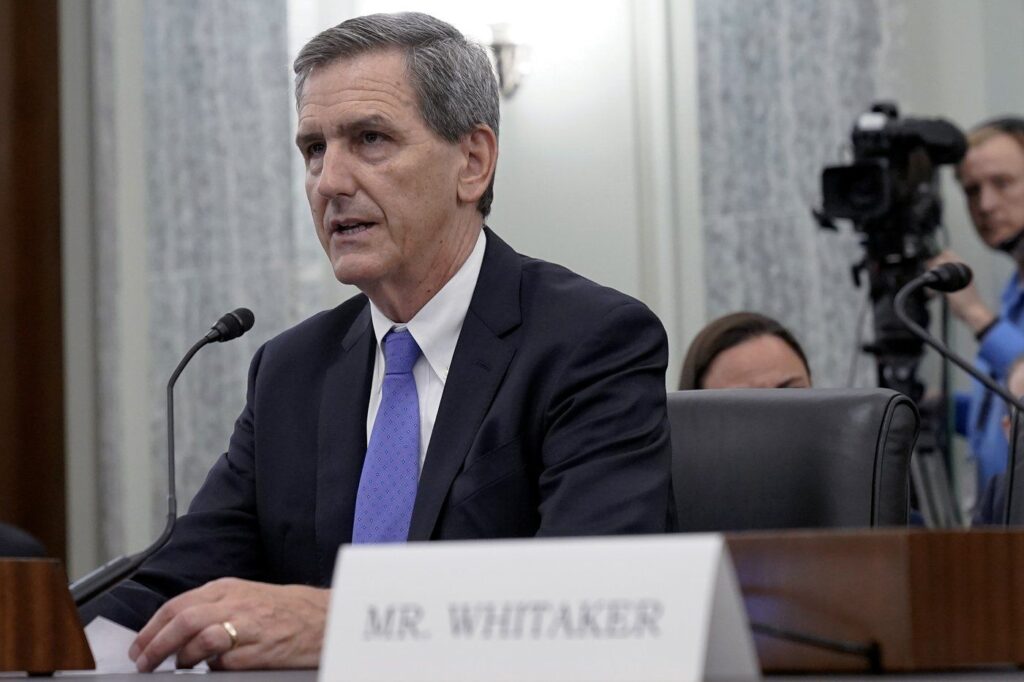
News
Aircraft manufacturers
The top US aviation regulator says oversight of Boeing ‘is not delivering safe aircraft’
February 6, 2024 By David Koenig, The Associated Press
 Michael Whitaker testifies during his nomination to be administrator of the Federal Aviation Administration, Department of Transportation, Oct. 4, 2023, on Capitol Hill in Washington. FAA Administrator Whitaker says the agency will use more people to monitor aircraft manufacturing and hold Boeing accountable for any violations of safety regulations. Whitaker is expected to face a barrage of questions Tuesday, Feb. 5, 2024, about FAA oversight of the company since a door panel blew off a Boeing 737 Max 9 jetliner over Oregon last month. (AP Photo/Mariam Zuhaib, File)
Michael Whitaker testifies during his nomination to be administrator of the Federal Aviation Administration, Department of Transportation, Oct. 4, 2023, on Capitol Hill in Washington. FAA Administrator Whitaker says the agency will use more people to monitor aircraft manufacturing and hold Boeing accountable for any violations of safety regulations. Whitaker is expected to face a barrage of questions Tuesday, Feb. 5, 2024, about FAA oversight of the company since a door panel blew off a Boeing 737 Max 9 jetliner over Oregon last month. (AP Photo/Mariam Zuhaib, File) WASHINGTON (AP) — The new chief of the Federal Aviation Administration said Tuesday that his agency is midway through a review of manufacturing at Boeing, but he already knows that changes must be made in how the government oversees the aircraft manufacturer.
FAA Administrator Michael Whitaker suggested that Boeing — under pressure from airlines to produce large numbers of planes — is not paying enough attention to safety.
NTSB says bolts on Boeing jetliner were missing before a panel blew out in midflight last month
Whitaker said that FAA has had two challenges since Jan. 5, when an emergency door panel blew off a Boeing 737 Max 9 jetliner over Oregon.
“One, what is wrong with this airplane? But two, what’s going on with the production at Boeing?” Whitaker told a House subcommittee. “There have been issues in the past. They don’t seem to be getting resolved, so we feel like we need to have a heightened level of oversight.”
Boeing flags potential delays after supplier finds another problem with some 737 fuselages
Whitaker, who took over the FAA about three months ago, was making his first appearance on Capitol Hill since the blowout over Oregon.
Separately, investigators with the National Transportation Safety Board were expected to release a preliminary report on last month’s incident as early as Tuesday.
Whitaker’s testimony before a House Transportation subcommittee was wide-ranging. Leaders of the panel had spelled out questions they wanted answered, but few lawmakers stuck to the script — they asked about everything from the Max 9 incident to raising the retirement age for pilots to migrants being housed at airports.
Whitaker said the FAA is halfway through a six-week audit that has involved placing “about two dozen” inspectors in Boeing’s 737 plant in Renton, Washington, and “maybe half a dozen” at a Wichita, Kansas, plant where supplier Spirit AeroSystems makes the fuselages for 737s.
The inspectors are looking for gaps in the quality of work during the manufacturing process that might have contributed to a door plug blowing off an Alaska Airlines Max 9 at 16,000 feet over Oregon.
Whitaker said he expects the FAA will keep people in the Boeing and Spirit factories after the audit is done, but he said the numbers haven’t been determined.
For many years, the FAA has relied on employees of aircraft manufacturers to perform some safety-related work on planes being built by their companies. That saves money for the government, and in theory taps the expertise of industry employees, but it was criticized after two deadly crashes involving Boeing Max 8 planes in 2018 and 2019.
“In order to have a truly safe system, it seems to me that we can’t rely on the manufacturers themselves to be their own watchdogs,” Rep. Colin Allred, D-Texas, said during Tuesday’s hearing.
Whitaker has said that the self-checking practice — in theory, overseen by FAA inspectors — should be reconsidered, but he again stopped short of saying it should be scrapped. But he said closer monitoring of Boeing is needed.
“The current system is not working because it is not delivering safe aircraft,” Whitaker said. “Maybe we need to look at the incentives to make sure safety is getting the appropriate first rung of consideration that it deserves.”
No Boeing representatives were scheduled to testify. The company did not immediately respond to a request for comment on Whitaker’s remarks.
Boeing and the FAA have been under renewed scrutiny since last month’s incident on an Alaska Airlines Max 9. Criticism of both the company and its regulator go back to deadly Max 8 crashes in Indonesia and Ethiopia that killed 346 people.
Whitaker vowed that FAA will “take appropriate and necessary action” to keep the flying public safe.
After the incident on the Alaska jet, the FAA grounded most Max 9s for three weeks until the FAA approved a process for inspecting panels called door plugs. FAA also said it won’t let Boeing increase the production rate of new Max jets until it is satisfied with the company’s safety procedures.
On Sunday, Boeing, which is based in Arlington, Virginia, disclosed that improperly drilled holes in the window frames will require the company to rework about 50 planes before they can be delivered to airline customers.